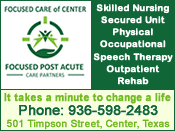Delaying care during pandemic may lead to complications for effective treatment
October 6, 2020 – “A mammogram can save a life.” This message is heard every year in October during Breast Cancer Awareness Month, but it applies all year round, even during the pandemic.
Christopher Sherman, MD a breast radiologist at Nacogdoches Medical Center, has seen the value of early detection time and again during his medical career. “We are here to help you fight breast cancer with information, advanced technology and compassionate medical care,” Dr. Sherman says. “Nearly 80 percent of breast cancers occur in women with no family history or known risk factors. Cancers in younger women tend to be more aggressive, so early detection is critical. Many women with breast cancer have had no symptoms, which makes screening so important. With regular screenings, advanced technologies are leading to more accurate diagnoses so breast cancer can be detected and treated in its earliest stages,” said Dr. Sherman. “Early detection is key. You should not delay preventive care, even during the pandemic.”
Patients can feel confident and safe at Nacogdoches Medical Center. Patient safety is the number one priority, and that commitment includes protective pandemic policies, safeguards and protocols.
Nacogdoches Medical Center offers a safe space for women to discuss concerns about the risk of developing breast cancer, receive information on prevention, or explore treatment options after receiving a diagnosis of breast cancer. Specialized nurse navigators walk with patients throughout their journey.
“Breast cancer is a frightening diagnosis but we are here to walk with patients through the entire journey,” said Katie Smith, mammography technologist. “We are here to not only provide convenient mammography services but to connect our patients with resources, support groups, and to be a shoulder to lean on when needed.”
The American Society of Breast Surgeons and the American College of Radiology recommend screenings as early as age 40, but those with a family history may consider being screened sooner. For women at high risk or who have been found to be positive for the BRCA1 or BRCA2 gene mutation, screening should begin between the ages of 25 and 30.
“Women should be proactive about knowing their breast density and risk assessment value, and no matter their schedule, make time to get screened,” said Dr. Sherman. “If you think you may be at risk, please talk to your doctor about recommendations for screenings and how often you should get them.”
3D mammography, which helps doctors detect breast cancer in its early stages, is offered to all patients at Nacogdoches Medical Center. We participate in tumor board care, which includes a team of multi-disciplinary physicians who create a care plan for each individual patient.
SOURCES:
- https://www.webmd.com/breast-cancer/news/20190503/breast-surgeons-issue-new-mammogram-guidelines#1
- https://www.cancer.org/latest-news/report-breast-cancer-death-rates-down-39-percent-since-1989.html
- https://www.cancer.org/latest-news/facts-and-figures-2018-rate-of-deaths-from-cancer-continues-decline.html









